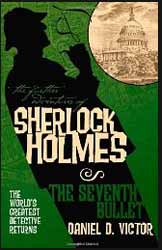|
Click here to return to the main site. Book Review
Sherlock Holmes’s desire for a peaceful retirement in the Sussex countryside is dashed when the true-life muckraker and author David Graham Phillips is assassinated in New York City. The pleas of his sister draw Holmes and Dr Watson to the far side of the Atlantic, where they soon find themselves caught up in a web of deceit, violence and political intrigue that only the great detective can unravel... Rather like The Stalwart Companions before it, The Seventh Bullet (originally published by St Martin’s Press in 1992) combines its author’s special knowledge of real-life historical personalities and events with an enthusiasm for the character of Sherlock Holmes. In the case of Daniel D. Victor, his specialist subject is the notorious American journalist and novelist David Graham Phillips, whose writing, including his sensational 1906 article “The Treason of the Senate”, sent shockwaves through the American government, damaging the careers of several US politicians, and earning him the epithet of “muckraker” from none other than President Theodore Roosevelt, but paving the way for the 17th Amendment of the US Constitution. According to The Seventh Bullet, “The Treason of the Senate” also provided the motive for his murder in 1911. Phillips is but one of several fascinating true-life personages in this narrative, which also features his sister, Carolyn Frevert; her husband, Henry Frevert; publisher William Randolph Hearst; and numerous politicians, including former President Roosevelt. Watson interviews these colourful characters during the first half of the book. There are some eyebrow-raising scenes of eccentric behaviour and scandalous revelations, including the suggestion of an incestuous relationship between Phillips and his devoted sister. Holmes himself is absent during these initial interviews, leaving Watson to fend for himself while the detective attends to other matters. This similarity to the plot of The Hound of the Baskervilles is also put into play in The Man from Hell, though in this instance it forms part of a cunning sleight of hand by the author. It also allows free rein to Watson’s imagination as he encounters the various personalities. Non-canonical Holmes adventures such as these tend not to acknowledge the works of other Holmes authors, except of course Sir Arthur Conan Doyle. Therefore, despite the presence of “Teddy” Roosevelt in this narrative, no reference is made to Roosevelt’s alliance with Holmes in New York (some of the same streets around Gramercy Park are visited in both novels) 30 years earlier in The Stalwart Companions, or to his subsequent correspondence with both Holmes and Watson about his documentation of that adventure. It’s possible that Watson simply doesn’t realise that the man with whom he corresponded all those years ago is the same person who later became President. A more likely explanation, however, is that Watson is being deliberately secretive about his and Holmes’s previous acquaintance with Roosevelt, because the detective had insisted that the events of The Stalwart Companions should not be made public during their lifetimes. Though written by an American and taking place largely on US soil, the narrative uses convincing British English, including terms such as pavement (as opposed to sidewalk) and kerb (as opposed to curb). However, as is often the case with this series, some typos have crept into Titan’s transcription of the original text. In most cases this didn’t affect my understanding of the story, though the quotation from Phillips at the start of Chapter Seven is indecipherable. That aside, Victor’s novel can be considered a success. 8 Richard McGinlay |
|---|


